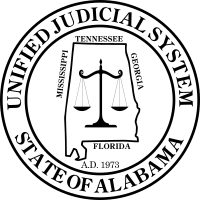
The Alabama Circuit Courts are the state trial courts of general jurisdiction in the State of Alabama. The Circuit Courts have jurisdiction to hear civil and criminal cases. For civil cases, the courts has authority to try cases with an amount in controversy of more than $3,000 and has exclusive original jurisdiction over claims for more than $10,000.[1] The Circuit Courts are the criminal trial courts for most felony charges,[2] and for some misdemeanors and lesser included offenses.[1] The Circuit Courts also have appellate jurisdiction over certain cases arising from the Alabama District Courts (the trial courts of limited jurisdiction in Alabama).
The state has 148 Circuit Court judges divided among 41 judicial circuits[3] with the number of judges to each circuit set by acts of the Alabama Legislature. The legislature distribution is roughly based upon caseloads of the various circuits. The largest circuit in the state is the 10th Judicial Circuit which encompasses Jefferson County (approximately 20% of the state's population) and is the seat of 27 of the judges. The smallest circuits are the 2nd, 3rd, 24th, 34th, 35th, 36th, 40th, and 41st which each contain just a single judge and represent many of the least populous counties in the state.
Circuit Judges are elected to six-year terms in partisan elections with no limit on the number of terms. Judges may not seek re-election upon turning seventy years of age. The partisan alignment of the Circuit Judges following the 2018 general election is 92 Republicans, 55 Democrats, and 1 Independent.[4] However, a large majority (35) of the Democrats 55 judgeships are in just two counties (Jefferson and Montgomery) while the Republican judgeships are spread among 45 different counties. In the event of a vacancy during a term of office, the Governor of Alabama usually has the authority to fill the unexpired terms. However, the 10th, 18th, 28th Circuits have judicial commissions which submit nominees from which the Governor is obligated to choose. Upon retirement judges may choose to become active retired where they serve as special judges when called upon and are still held to the cannon of ethics. Judges may also serve as special judges outside of their respective circuit while holding office when called upon.
- ^ a b The Guide to Alabama Courts
- ^ District Courts may hear guilty pleas in felony cases not invoking capital punishment.
- ^ Alabama Unified Judicial System Structure Archived 2010-05-27 at the Wayback Machine.
- ^ Williams & Garrett, The Alabama Guide (2009)